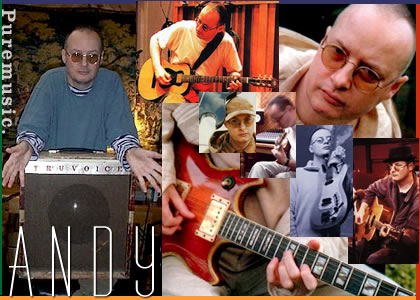
A Conversation with
Andy Partridge
(continued)
PM: But is it fair to say that, first and foremost, Ape is kind of poised to proliferate this box of outtakes, demos, and recently finished things, Fuzzy Warbles?
AP: Yeah--well, the big drive now is to--we have two things coming up, the collector's album, which is all of the Fuzzy Warbles stuff, you can either get it all in this beautiful box which looks like a stamp album, or you can buy the individual volumes separately. I want people to get whatever combination they're happy with. I don't want them to think I'm making them buy stuff twice, if they already have, say, four of the Fuzzy Warbles, or whatever. They can buy any combination they want. So we're working on that. And then we have another project coming up in January, which is an album, a double disc of totally improvised music with myself, Barry Andrews, the original keyboardist in XTC--
PM: Right.
AP: --and drummer Martyn Barker. We did a double disc of purely improvised music. And we said, "Look, we're not going to discuss this stuff, we're not going to talk about the keys, we're not going to talk about the feel of it, we're not going to talk about any of the tempos of anything. We're just going to book a studio, go in, and as soon as he's rolling we'll start and see what comes out."
PM: Wow.
AP: And we did three days, and in three days we got about eight hours worth of playing. Out of that eight hours, an hour and a half we think is really rather special. So that's coming out in January, that's called Monstrance.
PM: And so no bass--just keyboard, guitar, and drums.
AP: No bass. No overdubs, no bass, no other instruments, no vocals. It was just Barry on keyboards, myself on electric guitar, and Martyn on drums. And it was just, okay, ready, go! And some of the stuff that came out really surprised us.
PM: Unbelievable. I mean, for a guy who admittedly is not a writer of music or sparrows on the wires, to just get out there with his guitar and improvise. That's very interesting.
AP: Well, it's something that I've wanted to do ever since I was a teenager, because my musical background is like a real schizophrenic sort of double rail on the track. One rail is what you'd call pretty straight kind of pop music, I guess, with maybe a psychedelic twinge to it, Beatles, Small Faces, Kinks, Rolling Stones, that kind of thing, kind of classic '60s bands. And then the other rail on the track is really the more avant-garde or out there side of jazz. I had a big thing for people like Sun Ra, Albert Ayler, John Coltrane, Han Bennink, Lifetime--or even Captain Beefheart and His Magic Band, I guess, would fall in that sort of camp as well.
PM: Who I was a great fan of, as well.
AP: So with me, my musical upbringing was always a tension between the very straight, very accessible, and the really out there.
PM: And sometimes your penchant for the very out there would show up gloriously in just the freedom in the melodic part of the writing. And the chords would just go wherever they--
AP: Sure, yeah, the desire to bust all the barriers open with the melody there.
PM: I mean, that's what really set XTC apart immediately is that like yeah, well, don't worry about the usual harmony you've been hearing on the radio, because here's our song, and it's quite a bit different.
AP: But the jazzers did that, the great jazzers did that. They said, "Key, great. The key is for breaking, the key is for busting." And that's what I really like. I like, here's the key of the song, okay, the melody is going to bust it, the chords are going to bust it, the rhythm is going to bust it. And that's creativity. Creativity is thinking wrongly.
PM: Now, when you think about something like this exciting project with Barry Andrews and Martyn Barker coming out, it leads me to wonder, well, suppose there were just casual videos of Andy sitting around with his guitar, or with a couple of buddies and just playing some songs. I mean, doesn't everybody think that you could sell the hell out of that on the web? Hell yes!
AP: Yeah, probably. But I guess--I mean, I've got to be honest with you, I have a real aversion to being seen. It's almost a--
PM: Even on film?
AP: Yeah. I hate being photographed, and I hate being filmed. But despite that, Barry and I today were talking about the possibility of doing some live improvised broadcasts in the new year. So people could tune in and watch maybe two hours, and it'd be completely brand new, off the cuff. We don't know how it's going to go, nor do they, and it's filmed.
PM: Wow. Well, that's exciting. I hope that comes around.
AP: Yeah, me, too, because I kind of like the idea of that.
PM: Yeah, I'll be tuned in.
AP: It's really fresh for me, because for years and years I've been looking for the perfectly interesting stimulating song structure, and it's kind of like architecture, you can't be too free with it. But you can just soar like the bird when you're improvising. And the thrill of it is you don't really know where you're going.
PM: Yeah, if you can just disengage your mind, you're in such better shape, just let your hands do it.
AP: Yeah. continue
print (pdf) listen to clips puremusic home